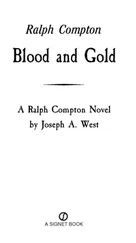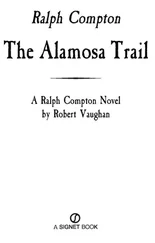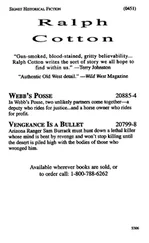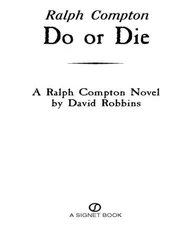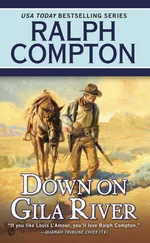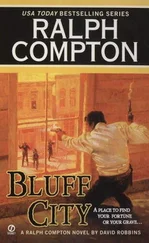Unfortunately, by the turn of the century, the Texas experience had been repeated in Arizona.
Today, despite modern range management, the entire basin is seriously overgrazed.
Don’t miss another exciting Western adventure in the USA Today bestselling series!
SLAUGHTER CANYON
A Ralph Compton Novel by Joseph A. West
Coming from Signet in January 2012.
Deputy United States Marshal Matt Battles sat his horse and studied the rain-lashed railroad siding. Under his slicker, his right hand rested on the worn walnut handle of the Colt tucked into his waistband.
A man born to vigilance, his hard, clear blue eyes scanned the railroad car drawn up just a few feet from the end of the rails. A chuffing locomotive made up the rest of the train, there being no other cars but the big Pullman.
Four soldiers wearing rubberized ponchos stood guard outside the car, their bayoneted rifles gleaming in the downpour. One smoked a pipe, his hand over the glowing coal to keep it alight.
Battles shifted in the saddle, then winced as pain gnawed at his left thigh. Carson City Tom Sanchez had put lead in there three years before. It had not been a serious wound as wounds go, but a hurt like that does pain a man in rainy weather.
Battles lifted his head as lightning scrawled across the night sky and thunder rumbled, still distant, but coming his way.
“Well, Matt,” he said aloud, the habit of men who ride lonely trails, “let’s get the damned thing over with.”
He kneed his buckskin forward and rode down a shallow, grassy rise to the gravel flat beside the tracks.
The sudden appearance of a tall man riding a stud horse drew an immediate response from the soldiers.
“Halt! Who goes there?” the smoking man challenged, talking through teeth clenched on the pipe stem.
Battles drew rein, then said his name.
The soldier’s proper response should’ve been “Pass, friend, and be recognized.”
It wasn’t.
“Come in slow and keep your hands where I can see them,” the soldier said. “I got faith in this here Springfield.”
Battles rode to within three feet of the soldiers and stopped. They faced him in a bayoneted semicircle, neither hostile nor friendly, just ready and aware.
The four men had the lean, tough look of old Apache fighters and had probably been handpicked for this guard detail.
A careful man his own self, the marshal kept his motions to a minimum, and none of them were quick.
“State your intentions,” the pipe-smoking soldier said.
Battles’s amused smile erased a dozen years from his face and softened the hard, tight planes of his jaw and mouth.
“My intention is to follow my orders and present myself to the president of the United States,” he said. Then, as a clincher: “I have a letter of introduction from Governor Roberts.”
“Wait there,” the soldier said. “I’ll talk to the colonel.”
He vanished inside the Pullman and appeared a few moments later, followed by a beautiful officer wearing an impeccable dress uniform, gleaming in blue, silver, and gold. A black, spade-shaped beard, trimmed, combed, and scented, spread across his breast and he wore a crested signet ring on his left pinky finger.
The officer stayed under the shelter of the car’s platform and beckoned Battles closer. He stretched out an arm and was visibly irritated as raindrops spattered his uniform.
“I’m Colonel James Sinclair,” he said. “Show me your bona fides.”
Battles reached under his slicker, a move that tensed the soldiers, and produced two pieces of paper. One he passed to the colonel, the other he again stuffed under his slicker.
As Sinclair read, thunder rumbled across the sky and lightning flashed.
Fretting over the delay and his growing discomfort, Battles peered through the downpour at the Pullman. All the car’s windows were lit up, rectangles of orange in the rain-needled darkness. He thought he heard the chink of glasses from inside and a man’s laughter, but, because of the dragon hiss of the storm, he wasn’t sure.
The beautiful officer looked up from the letter he was holding and looked at Battles.
“Come inside, Marshal,” he said. He motioned to the soldiers. “One of you take the marshal’s horse and see if you can find a place for it out of the rain.”
Battles swung out of the saddle and followed the colonel into the Pullman.
He found himself in a small office with a couple of desks. A sergeant orderly sat at one of the desks and rose to his feet when Sinclair and Battles entered.
“Take the marshal’s coat and hat, Sergeant,” the colonel said. He managed a smile that was neither friendly nor amused. “And try not to drip all over the damned rug.”
After Battles shrugged out of his slicker, Sinclair stretched out a hand.
“Please, Marshal, you won’t need the firearm,” he said.
It was useless to argue the point, and Battles surrendered the Colt.
“It will be here for you when you leave, I assure you,” the colonel said, placing the revolver in his desk drawer.
Sinclair had very white teeth, the canines large, wet, and aggressive, and the marshal pegged him as an ambitious career soldier who had fought all his battles in Washington.
“Wait here,” he said.
Sinclair opened the door that led from the office into the main interior of the car and closed it quietly behind him.
The sergeant, a grizzled man with a deeply lined face, had regained his seat behind his desk. He smiled at Battles.
“The colonel can be brusque,” he said.
“Some men are,” Battles said.
“Officers mostly, the brusque ones.”
After a few moments’ silence, the soldier said, “You’ve been through it, Marshal.”
“Some.”
“You’ve got the scars. Inside, where they don’t show.” He smiled again. “But I can see them plain.”
Battles studied the man, his hard eyes measuring him. “I could say the same thing about you.”
“You could.”
The sergeant lapsed into silence again, and then said, “Know what I think?”
Battles said nothing.
“Too many dead men in our pasts, friends and foe alike. All that dying weighs on a man after a spell.”
The marshal’s smile again held that amazing warmth and youthfulness. “You’re a philosopher, Sergeant.”
The old soldier nodded. “Uh-huh, nowadays it’s about all that’s left to me.”
The door opened and Colonel Sinclair entered and looked at Battles.
“The president of the United States will see you now,” he said.
President Chester A. Arthur, a waxy-faced man who sported bushy sideburns and a magnificent mustache, sat behind a vast mahogany desk. To his left a thin, long-fingered clerk held a sheaf of papers and affected a worried look. Colonel Sinclair stood behind the president.
Arthur waved Battles into the chair that fronted his desk. He studied the lawman for a few long moments, then said, “Are ye sharp set?”
Battles shook his head. “No, Mr. President, I ate earlier.”
“Then a glass of brandy with you?”
“Please,” Battles said.
The clerk put his papers on the desk and crossed to a campaign table that held several decanters and a collection of glasses.
He poured brandy for Battles and passed him the drink.
Battles looked at Arthur over the rim of his glass. The president was a sick man that spring of 1882, already suffering from the kidney disease that would kill him five years later, and it showed on him.
“The brandy is to your liking, Marshal?” he said.
Battles nodded. “It’s excellent, sir.”
“Good, good, very good.” Arthur hesitated, then said, “I read your letter of introduction from Governor Roberts. He thinks very highly of you.”
Читать дальше

